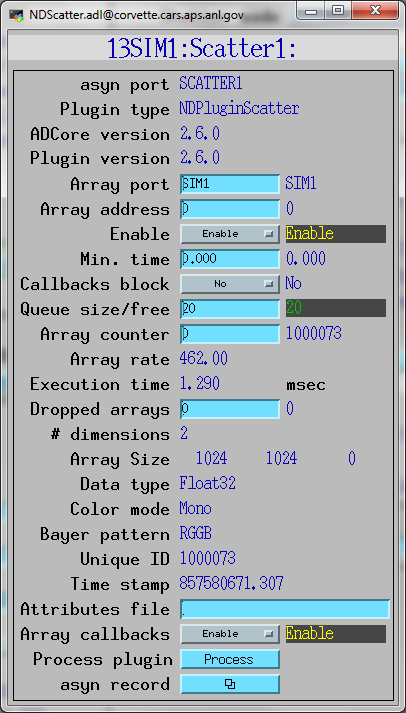NDScatter.adl

This plugin is used to distribute (scatter) the processing of NDArrays to multiple downstream plugins. It allows multiple intances of a plugin to process NDArrays in parallel, utilizing multiple cores to increase throughput. It is commonly used in together with NDPluginGather, which gathers the outputs from multiple plugins back into a single stream. The documentation for NDPluginGather provides a detailed example of using NDPluginScatter and NDPluginGather to do parallel processing of 5 statistics plugins.
This plugin works differently from other plugins that do callbacks to downstream plugins. Other plugins pass each NDArray that they generate of all downstream plugins that have registered for callbacks. NDPluginScatter does not do this, rather it passes each NDArray to only one downstream plugin. The mechanism for chosing which plugin to pass the next NDArray to can be described as a modified round-robin. The first NDArray is passed to the first registered callback client, the second NDArray to the second client, etc. After the last client the next NDArray goes to the first client, and so on. The modification to strict round-robin is that if client N input queue is full then an attempt is made to send the NDArray to client N+1, and if this would fail to client N+2, etc. If no clients are able to accept the NDArray because their queues are full then the last client that is tried (N-1) will drop the NDArray. Because the "last client" rotates according the round-robin schedule the load of dropped arrays will be uniform if all clients are executing at the same speed and if their queues are the same size.
Their is an NDPluginScatterMethod parameter in the driver to allow future implementations of other scheduling schemes, should this prove desireable.
NDPluginScatter inherits from NDPluginDriver. NDPluginScatter does not do any modification to the NDArrays that it receives except for possibly adding new NDAttributes if an attribute file is specified. The NDPluginScatter class documentation describes this class in detail.
The NDPluginScatter plugin is created with the NDScatterConfigure command, either from C/C++ or from the EPICS IOC shell.
NDScatterConfigure (const char *portName, int queueSize, int blockingCallbacks,
const char *NDArrayPort, int NDArrayAddr, size_t maxMemory,
int priority, int stackSize)
For details on the meaning of the parameters to this function refer to the detailed documentation on the NDScatterConfigure function in the NDPluginScatter.cpp documentation and in the documentation for the constructor for the NDPluginScatter class.
The following is the MEDM screen that provides control of the NDNDPluginScatter plugin. Note that it currently only contains the controls for the base class NDPluginDriver.
